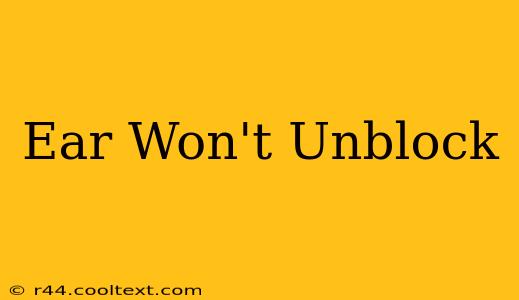Feeling that frustrating plugged sensation in your ear? An ear that won't unblock can be incredibly annoying and even painful. This comprehensive guide explores the various reasons why your ear might feel blocked, effective home remedies, and when it's crucial to seek professional medical attention.
Common Causes of a Blocked Ear
Several factors can contribute to that uncomfortable feeling of a blocked ear. Understanding the underlying cause is the first step towards finding relief.
Earwax Buildup:
This is perhaps the most common culprit. Earwax, or cerumen, naturally protects your ear canal, but excessive buildup can lead to a feeling of fullness or blockage. Impacted earwax can also cause hearing loss, tinnitus (ringing in the ears), and even pain.
Fluid Buildup (Serous Otitis Media):
Often associated with allergies, colds, or sinus infections, fluid can accumulate behind the eardrum, creating a sense of pressure and blockage. This is particularly common in children.
Eustachian Tube Dysfunction:
The Eustachian tube connects the middle ear to the back of the throat. If this tube becomes blocked or malfunctions, it can prevent proper air pressure equalization, resulting in a blocked feeling. Changes in altitude (flying, driving in mountains) can exacerbate this.
Infection (Otitis Media):
Middle ear infections can cause significant pain, pressure, and a feeling of blockage. These infections are often accompanied by fever and other symptoms.
Foreign Objects:
Small objects, especially in children, can become lodged in the ear canal, leading to a sense of blockage and potential hearing impairment.
Barotrauma:
Rapid changes in air pressure, such as during air travel or scuba diving, can affect the middle ear, causing discomfort and a feeling of fullness.
Home Remedies for a Blocked Ear
Before seeking medical advice, you can try these gentle home remedies to alleviate a blocked ear:
Warm Compress:
Applying a warm compress to the affected ear can help soothe discomfort and potentially loosen earwax.
Saline Nasal Spray:
If Eustachian tube dysfunction is suspected, using a saline nasal spray can help clear congestion and improve drainage.
Yawning and Swallowing:
These actions can help equalize pressure in the middle ear and relieve blockage.
Chewing Gum:
Similar to yawning and swallowing, chewing gum can help stimulate the Eustachian tube.
Important Note: Avoid inserting cotton swabs or other objects into your ear canal. This can push earwax further in and potentially damage the eardrum.
When to See a Doctor
While home remedies can be helpful, it's essential to seek professional medical attention if:
- You experience severe pain.
- You have a high fever.
- You notice drainage from your ear.
- Your hearing loss is significant or persistent.
- Home remedies haven't provided relief.
- You suspect a foreign object is lodged in your ear.
A doctor can properly diagnose the cause of your blocked ear and recommend the appropriate treatment, which may include ear irrigation, medication, or other procedures.
Preventing Blocked Ears
Maintaining good ear hygiene and addressing underlying medical conditions can help prevent future instances of blocked ears. Regularly cleaning your ears gently with a soft cloth can remove excess earwax. Treating allergies and infections promptly can also reduce the risk of fluid buildup.
This information is for general knowledge and does not constitute medical advice. Always consult with a healthcare professional for any health concerns.

